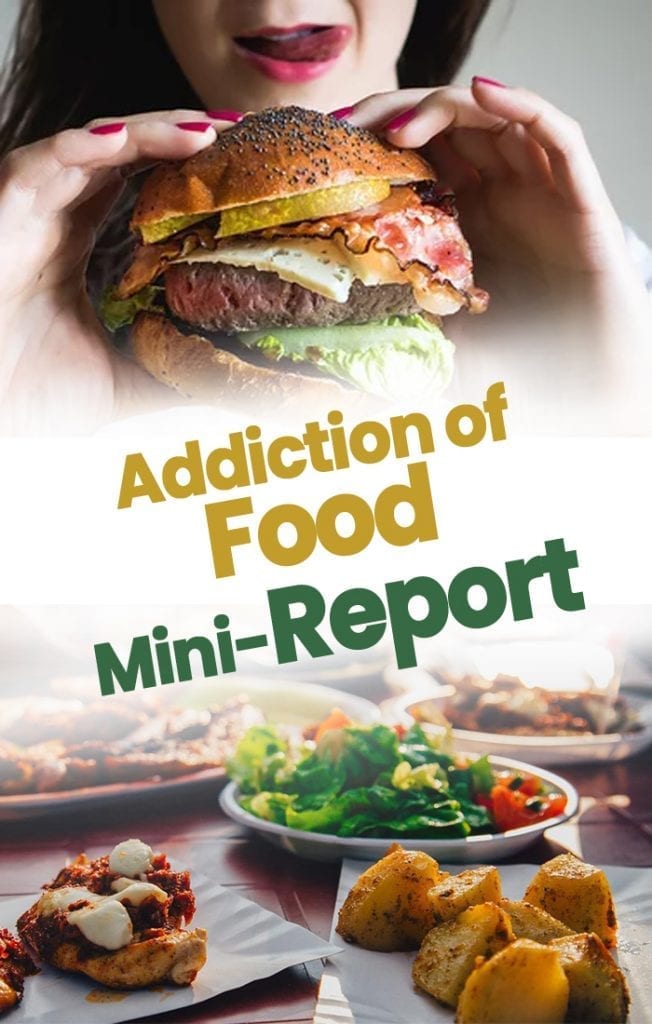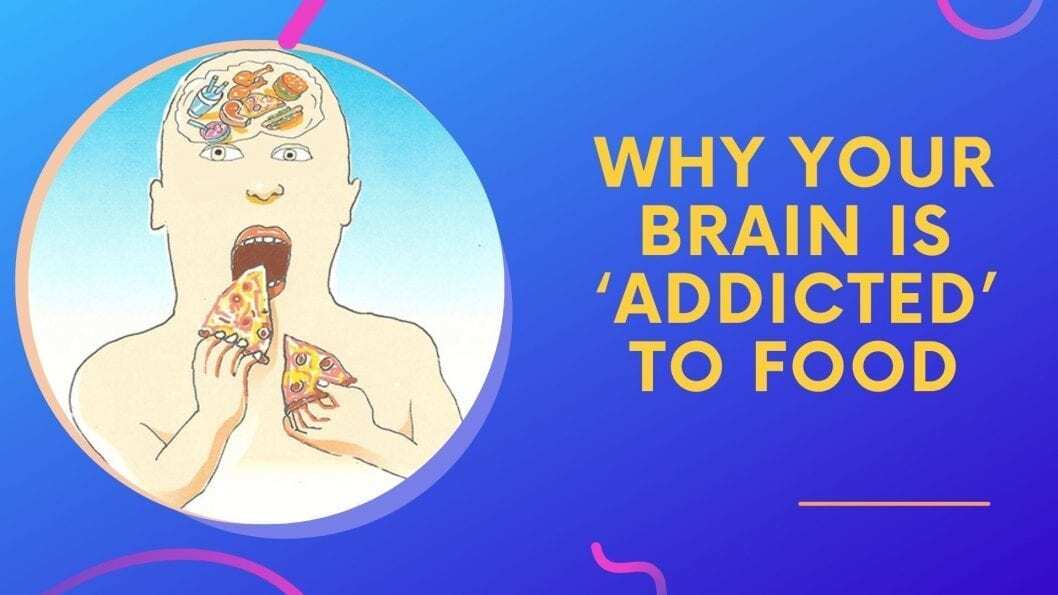Food addiction is a popular concept, but not necessarily grounded in science.
If you’ve ever been to an Overeaters Anonymous group you’ll have undoubtedly heard people identifying themselves as ‘food addicts’.
The idea that food can be addicting is common because both food and truly addictive substances like alcohol light up similar regions in the brain and release identical chemicals.
Dopamine is one such neurotransmitter that gets released in situations involving both substance addiction and food. For example, dopamine gets released when a person with an alcohol addiction drinks and also when a person who self-identifies as a ‘food addict’ consumes their ‘forbidden’ food.
Overall, food addiction is a popular concept because people emotionally experience cravings for both food and alcohol. It’s therefore easy to assume that food is an ‘addictive’ substance just like alcohol.
But if your concept of food ‘addiction’ was actually just an illusion?
To better understand food addiction let’s take a look at a famous scientific example involving mice and cocaine.
The study is simple and you could replicate it yourself at home, if you were a little sadistic. All you do is put a rat in a cage in a dark room and give the rat two choices: to drink regular water, or to drink water mixed with cocaine.
The rat will choose to drink the water with cocaine until it dies. But here’s the real question – does this rat cocaine example truly demonstrate a substance addiction?
There are some scientists who will say “yes”. For example, some scientists have noted that the dopamine chemical gets released and keeps the rat ‘addicted’ to cocaine. Therefore, cocaine is an addictive substance. The rat’s brain releases dopamine, the rat becomes addicted to cocaine and eventually the rat dies an early death.
Isn’t this evidence enough of a substance addiction? And isn’t food, basically, the same thing as cocaine? The same regions of the brain light up with food and cocaine. The same neurochemicals get released. So can’t food be an addiction too, just like cocaine?
But what if you put the mice in a cage with friends and sunlight?
Johann Hari asked this question in his Ted Talk (which has 16 million views). He asked, “What if everything we knew about addiction was wrong?”.
Johann cites the work of Bruce Alexander, a professor of psychology in Vancouver. Dr. Alexander wanted to study the underlying conditions leading up to addictive behaviors. To study the underlying conditions of addiction, Dr. Alexander designed another simple rat study.
Instead of a dark cage and isolation, rats were instead placed in another cage but with sunlight, lots of room to roam, and lots of other rats to have sex with. The rats were happy, instead of deprived. Instead of isolation, loneliness and secrecy the rats had connection, light and joy.
The rats were still given two choices: drink normal water or drink water mixed with cocaine. But the results were strikingly different. Instead of becoming addicted to cocaine water and drinking until an early death, these happy rats totally ignored the water with cocaine and only drank the normal water.
The same conclusions can be applied to food ‘addiction’ as well, which is an opinion of mine that is widely held by other health professionals as well.
If underlying conditions are present like loneliness and deprivation, the human brain can start to crave food in ways that mimic addiction. However, food itself is not addicting because if these underlying conditions are understood and accounted for, then the powerful urges and food cravings diminish.
Here are 4 brain-based reasons why food can be highly rewarding.
Each of these reasons shows how your brain can seemingly be addicted to food, but how under different circumstances, your brain wouldn’t experience food as being addictive.
Unfortunately, many times these reasons get combined. For example, when people feel unsafe (reason #1 below) and they also feel hungry (reason #2 below), this is when things get out of balance and when food can seem to be ‘addictive’.
However, these reasons also help paint an inspiring new vision for treatment of ‘food addiction’, compulsive eating, and binge eating.
Instead of someone being ‘an addict’ and therefore almost helpless to combat their addiction, a person can instead concentrate their energies upon solving the underlying problematic conditions first, and then seeing their cravings disappear naturally.
Let’s review these brain-based reasons behind food cravings and how to treat the underlying causes of food ‘addiction’.
1 – Survival and Safety
Rats in the dark cage felt very unsafe, whereas the happy rats felt safe.
Humans have survived as a species in part because of a reward system involving dopamine. Dopamine makes you feel good and motivates you to do things that keep you and ultimately the species alive – like reproduction, sleeping, finding warmth and eating.
Yes, humans obviously need food to survive, and dopamine gets released when food is eaten. This is the first reason why food is not addictive in the technical sense. You need food to survive! On the other hand, you do not need alcohol or cocaine to survive.
In certain circumstances a person can feel threatened. Sometimes even a normal situation can bring up traumatic memories. In these circumstances when a person doesn’t feel safe, their survival instincts can kick into play. On high alert, a person could begin to crave the dopamine that results from eating food, in order to feel safer.
With rats, the rats in the dark cage felt unsafe. They needed the dopamine chemicals to feel better to manage their fear of death. The happy rats, on the other hand, were not in a frightening situation. Therefore, they didn’t have anything to run away from in fear.
Therefore, the underlying condition to take care of is perceived threat to survival. If you can feel safe, deep down, then food won’t be as addicting.
2 – Hunger
Rats in the dark cage were nutrient deprived, whereas the happy rats had plenty of food.
Hunger makes food more appealing. If you are really hungry food will start to sound more appealing. You’ll start to think more about food.
Therefore, hunger itself is another natural reason why food can be rewarding. But when you get really hungry, we don’t say that you are ‘addicted’ to food. We just say that you’re really hungry!
However, when you combine extreme hunger with feeling unsafe (and other factors down below), that’s when food starts to seem like it’s addictive. This is why dieting is the number one predictor of food addiction and compulsive eating.
Fun fact – historically speaking, starvation was one of the top two main causes of human death. The other main cause was childbirth when up to 25% of women would die.
Because starvation kills people, our brains have developed complex neurofeedback mechanisms to make extreme hunger feel very unpleasant and eating food to be highly rewarding.
Together, the avoidance of the unpleasant feel of extreme hunger and the pleasure of eating are biological reasons that can make people eat more food. But again, these are natural brain-based reasons, dispelling the notion of food addiction.
3 – Dopamine Deprivation
Rats in the dark cage had nothing to look forward to except cocaine. Rats in the sunny cage had lots of activities that produced happiness.
Because dopamine is essential to human survival, humans need a baseline level of dopamine.
Many activities produce dopamine release, such as connecting with friends, regular movement, music, and as we have covered above, eating. But we don’t say that you’re addicted to music or chatting with your friends, do we?
Unfortunately, humans literally need more dopamine from food if they aren’t getting enough dopamine from other sources. This explanation alone explains why rats in dark cages become addicts whereas happy rats remain unaffected.
Again, the lack of dopamines makes food seem addicting but in reality the food cravings would be more related to the dopamine deprivation, not food itself actually being addicting.
If a person felt unsafe, was chronically hungry, and was deprived of dopamine then it’s easy to see why cravings for food would become intense. The cravings would be so intense you would think were actually addicted to food!
4 – Eating Forbidden Food Decreases Binge Eating
Happy mice could have cocaine water, but didn’t have any.
There have been studies showing that when binge eaters consume the foods they deem ‘forbidden’, their cravings and then their binge eating behavior significantly decreases.
Please note that these studies have the binge eaters eat their forbidden foods in controlled situations — for example, only eating their forbidden foods once per week in a pleasant setting when not too hungry.
Unfortunately, oftentimes people will hear about this idea of ‘letting themselves eat anything’ and then consume far too much food.
However, oftentimes when people do ‘let themselves eat anything they want’ the underlying conditions of feeling unsafe, being chronically hungry, or dopamine deprived are still present.
Eating too much under these circumstances gives the appearance that these individuals need to have restrictions on their eating because they are addicted to food, but again, it’s the underlying conditions that are causing the seeming addiction.
Sadly, many people who believe they cannot eat certain foods will end up being hungry again or end up feeling unsafe around those foods, which sets up another instance where they crave foods to feel safe or to satisfy their hunger.
If these people focused on having eating experiences that made them feel content, had a balanced lifestyle and got dopamine from a variety of sources, and practiced self-care to feel more safe, then these urges would subside considerably.
But what about other science in favor of food addiction being a valid scientific concept?
There are other scientific perspectives that believe food addiction is a valid concept.
For example, the Yale Food Addiction questionnaire has gotten a lot of attention. However, this questionnaire upon closer inspection actually measures compulsive eating as a result of deprivation, hunger, and dieting.
Basically, this study reportedly measures ‘food addiction’ but in reality measures the underlying circumstances leading up to the appearance of food addiction!
One true or false question highlights this well: I worry about cutting down on certain foods.
This question at first glance seems to measure food addiction. However, if a person was in a deprived and hungry state, then it would be perfectly natural to worry about cutting down certain foods! Far from measuring ‘addiction’, this study in fact measures the conditions leading up to addiction! (For information on how the Yale questionnaires were scored read here.)
In fact, almost all ‘food addiction’ studies make this same mistake.
They study what seems to be food addiction – but they never account for underlying factors leading up to the appearance of food addiction.
Seriously, no food addiction studies ever account for the underlying state of deprivation. Whether it be a dark cage, loneliness, or other forms of deprivation, this is never accounted for in various studies which supposedly support the scientific notion of food addiction.
Why this seems straightforward to understand,unfortunately, the stigma of ‘addiction’ is hard to shake. Both people and scientists can come to conclusions that simply don’t bear out in real life. Even worse, these conclusions might result in unproven methods to stop binge and compulsive eating, like some restrictive versions of Overeater’s Anonymous such as OA-20.
This particular form of Overeater’s Anonymous, OA-20 often prescribes people diets that totally abstain from sugar or carbohydrates, which then set people up to feel deprived and need food to feel better.
Unfortunately, many of these people precisely because they are on a restricted diet then feel helpless in the face of their ‘food addiction’. But – if they hadn’t believed they were an addict in the first place and instead of focused on healing the underlying deprivation – then they wouldn’t find themselves repeating the same patterns of addiction.




